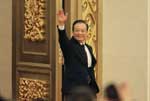Shocking scenes behind the fabrication
Updated: 2012-03-28 08:04
By Berlin Fang (China Daily)
|
|||||||||||

On Jan 6, National Public Radio of America aired an episode of This American Life featuring excerpts from actor Mike Daisey's solo show, The Agony and the Ecstasy of Steve Jobs, describing Daisy's supposed findings from a "research trip" to Shenzhen, China, and the allegedly miserable working conditions at FoxConn, one of Apple's major manufacturers in China.
Daisey is not a journalist, but an independent performer of a one-man show. In his show he uses dramatic license to include exaggerations and fabrications for theatrical effect. However, this is no longer Marco Polo's world when one traveler to a faraway land can tell a story the way he wants and everybody simply believes him, and the loopholes in Daisey's story were soon exposed and discussed and analyzed in other major media outlets.
As a result, Ira Glass, the producer and host of This American Life retracted the program aired on Jan 6 and produced a 58-minute program in which Glass interrogated Daisey as a lawyer would interrogate a criminal. Daisey's telltale pauses and silences were faithfully kept in this Pinteresque radio drama about truth and lies.
Daisey has defended himself by saying: "What I do is not journalism. The tools of the theater are not the same as the tools of journalism. For this reason, I regret that I allowed This American Life to air an excerpt from my monologue. This American Life is essentially a journalistic not a theatrical enterprise, and as such it operates under a different set of rules and expectations."
However, the furor over Daisey's dramatic license means that in the future, people in the United States will be very cautions about criticizing Apple's processing operations and FoxConn's labor conditions. This may be great news for Corporate America, but it is very bad news for the workers in China who produce the products these multinationals profit from.
I am afraid that this greater truth is being lost in the media glare of the scandal. For instance, some have claimed that contrary to working long hours in a sweatshop, workers at FoxConn actually complain of not having enough overtime. Counterintuitive as this may sound, it is only natural given the fact that a large number of factory workers are migrant workers who have come to these factories to make money as quickly as possible to realize dreams that are common to many people the world over: buying a house, getting married, having a family. Cut off from their families and previous rural lives, of course they do not mind some extra work, especially if it means they get double pay.
Ignorant of this context, labor organizations and international media are all too quick to rigidly apply the standards of developed countries when evaluating working conditions in a Chinese factory. So wages are increased a little and "overtime" is cut. This makes everyone happy, except the workers, who can no longer work more to earn more.
But regardless of the hours they work, Chinese workers endure working and living conditions that no American worker today would accept. Benchmarked against working conditions in the developed world, many businesses in China would not even be marked a C or D. As a developing country, China's labor conditions are the same as those experienced by US workers years or decades ago.
As a nation China should be committed to improving the working conditions for the tens of millions of migrant workers, and should strive to create jobs closer to their homes or make it easier for them to settle in the cities where they work.
To me, that is the greater truth that needs telling.
The author is a US-based instructional designer, literary translator and columnist writing on cross-cultural issues.
(China Daily 03/28/2012 page8)




